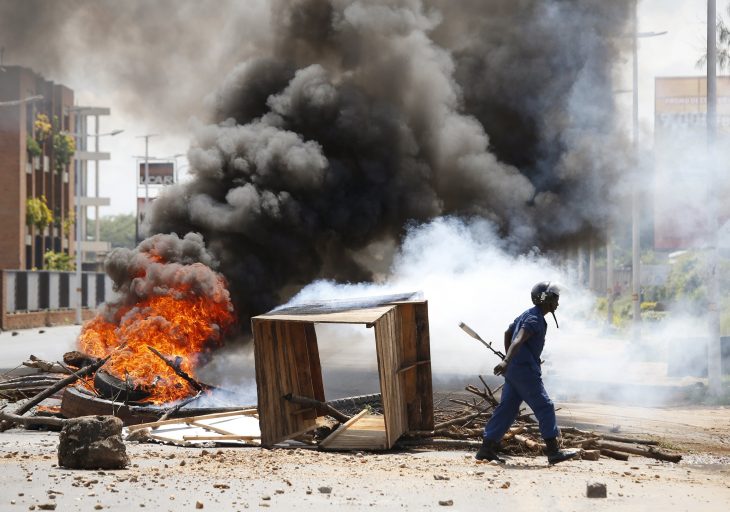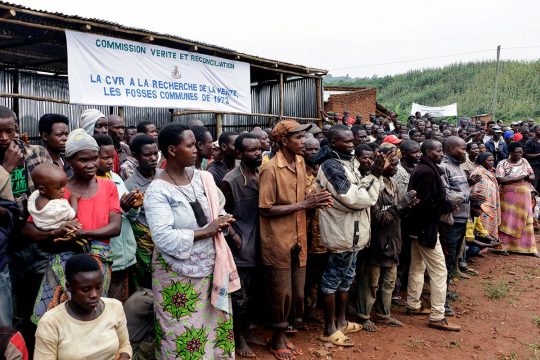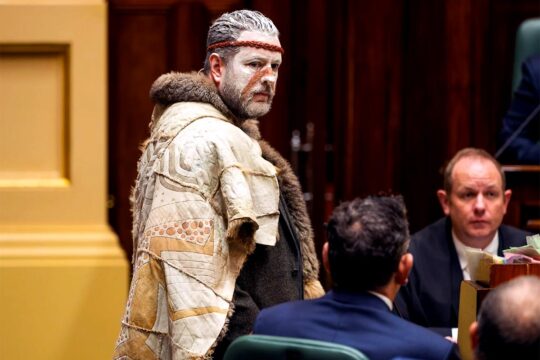After the Central African Republic last week, we will now look at Burundi authorities’ approach to forgiveness for mass crimes before the President’s bid for a third term unleashed the latest outbreak of violence. In Burundi, proposed policies are very much shaped by the State, which is encouraging victims to forgive and criminals to repent. Next week we will look at forgiveness policies in Rwanda.
In December 2000 Arusha accords to end a terrible civil war in Burundi that left 300,000 dead, the warring parties agreed to set up a Special Tribunal to bring to justice suspected perpetrators of international crimes, and also to create a Truth and Reconciliation Commission (TRC). Despite pressure from the United Nations and international community, it took 14 years before the TRC was officially set up and 11 commissioners, including six religious leaders, nominated.
The TRC’s mandate is to shed light on all the major violations of political, economic and social rights from independence in 1962 to the end of the civil war in 2008; to map mass graves and take steps to ensure dignified exhumations; and to publish a list of “victims who have granted their forgiveness, as well as perpetrators who have been granted it”. As for the Special Tribunal, also provided for in the Arusha accords, the authorities have put it off, even though popular consultations in 2008 organized by the Burundian government and the UN found that 68% of people questioned thought serious human rights abusers should be brought to justice.
A new cycle of violence
Since May 2015, Burundi has been locked in a new cycle of violence, ever since President Pierre Nkurunziza announced his intention to run for a third term. This goes against the Arusha accords and has been denounced by the United Nations and Western governments. Nobody knows if the TRC still has a reason to exist in the current circumstances. But let us pursue our analysis of Burundi’s forgiveness policy, because it reveals a type of forgiveness fashioned by the State, which is encouraging victims to forgive and criminals to repent. This is the sense of Article 64 of the TRC’s statutes:
“In view of the aim to promote reconciliation between victims and suspected perpetrators, the Commission is to establish a procedure whereby victims can grant their forgiveness to perpetrators who ask for it and express regret.”
Let us note here that the Commission is supposed to act on several levels: first, by setting the political framework in which repentance and forgiveness can be expressed by the concerned parties and, in the same vein, by granting the State’s seal of legitimacy, or should we say benediction. The Commission is then supposed to determine the procedure through which this symbolic repentance/forgiveness transaction is made, and itself serve as a guarantor. The statutes of the Commission imply – without explicitly saying so – that State justice then has no role to play, once there has been reconciliation between the victim and the perpetrator. All indications are that repentance/forgiveness transacted at individual level is then recognized by the community. And so there are no penal sanctions.
This interpretation of Article 64, which amounts to granting amnesty – even if the word amnesty does not figure in the TRC statutes – seems to be confirmed when one looks at the preparatory work. A memorandum from the ruling CNDD-FDD party published in May 2007 gives the following justification for amnestying “those who have confessed”:
The granting of amnesty to perpatrators of human rights abuses who have confessed is a fundamental element of national. […] Confession is a high price to pay for freedom, and the granting of liberty is also a high price to pay to get a confession.” The memorandum also explains that « the CNDD-FDD party believes mutual forgiveness is the best way to guarantee national reconciliation and lasting peace.”
State benediction for repentance and forgiveness
As stressed by jurist Stefan Vandeginste, the party thus establishes “a direct link between confession, forgiveness, reconciliation and the possibility of bringing perpetrators to justice”. This approach is no doubt influenced by the Head of State, who has become a fervent evangelist. The TRC, which is conceived simultaneously as political and religious authority and Registrar, gives legitimacy to the symbolic repentance/forgiveness transaction, absolving perpetrators at collective level of their criminal acts.
Many questions remain on this, and are so far unanswered. Is this, to coin the phrase of French philosopher Jacques Derrida, a question of “pure” repentance on the part of the perpetrator, or merely an opportunistic one? And what of the free choice of victims who are under strong pressure to grant forgiveness? This pressure is all the stronger given that it is not only the State but the churches exerting it, since six of the eleven nominated commissioners are religious personalities, including the chairman and vice-chairman of the TRC. And again, what of victims who refuse to grant forgiveness? This process seems to put responsibility for the criminal act on the individual, but can it also render justice for a form of violence that was often systemic?
Fear of criminal investigations
Everything seems to indicate that at the time when the Nkurunziza government and then parliament decided in 2014 on this approach to forgiveness, they wanted to set up a TRC to meet the requirements of the last clause in the Arusha accords, which had not thus far been met (nor on the Special Tribunal). In doing this, it seems it was also a question of avoiding recourse to criminal justice, because this was perceived by the Burundian government as counter-productive, since it could destabilize a fragile country. It is true that in this tiny country of 20,000 square km – twice as small as Switzerland – a brutal civil war left 300,000 dead, and that nearly all the armed groups plus the army were responsible. If criminal procedures were started, they could potentially concern a lot of the current leaders, including the Head of State himself, who was at one time sentenced to death for war crimes. This reluctance to resort to penal procedures is reflected in the vagueness of the TRC statutes with regard to its mandate to categorize crimes as war crimes, crimes against humanity or genocide which, according to international law, are imprescriptible, and therefore their perpetrators must in theory be brought to justice.






